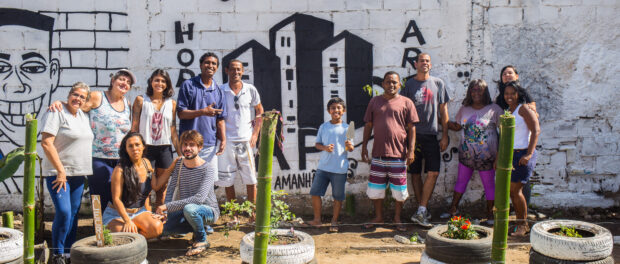
Ap do Amanhã: Garden, Culture, and Art is the passion project of Alan Pierre, a resident of the Ap de Bangu, popular name given to the Dom Jaime Câmara Housing Development, which was for a long time the biggest public housing complex in Latin America. Today it is home to 56,000 residents. Alan is a volunteer assisting with the maintenance of the theater and athletic court in a municipal school of the sub-district, located between Padre Miguel and Bangu.
His own project, the ‘Ap do Amanhã’–alluding to a better amanhã or ‘tomorrow’ for Ap de Bangu–seeks to fortify community ties in the area through the establishment and maintenance of an agricultural collective, stimulating the consumption of organic food produced locally. Alan presents his big challenge: “to spread conscientious attitudes, so that together, we will be able to live in a place that is cleaner, more organized, and more prosperous.”
On the July 15, the first mutirão, or collective action effort to establish a community garden was undertaken by an initial group of volunteers and professionals with a background in agro-ecology and nutrition. A while ago, culinarist Danielle Oliviera of City of God and other collaborators were already cultivating seedlings in their residences and awaiting the official date of planting. The chosen locale for the first effort was a flowerbed, bordering a tranquil and residential road of the community, Emílio Ribas Road, near the Ceres Soccer Field. “Previously, there were many sales stalls, that, because of political pressure, were removed to allow space for a cycle path which was never completed. The flowerbed had a lot of trash. We cleaned it, and now we are establishing the garden,” said Ana Cláudia, Alan’s wife.
Alan Pierre expresses his gratitude for the collaborators that help in the mobilization of the project, “they, many times, work in local commerce; some are unemployed, but still, they like to work as volunteers and help with an open heart because they believe [in the project].” Whoever participates directly learns ecology by contributing to the separation of organic residues used for compost and soil nutrition. Beyond strengthening good nutritional–and consequently, good life–habits, Alan encourages the community to work together to care for public spaces. “What we have now is so little, we need to care for what is ours. It is very good to be able to join with intelligent people and visionaries to carry this project forward,” explains Ana Cláudia.
The specific location of the pilot garden was designated by Alan Pierre especially for having small dimensions, compatible with this phase of testing, which aims in the first month to see how the community responds to the new initiative: “It is all new to people; I take it one step at a time.” Following learning with the first cultivation, the next goal is to extend the planting to another, more expansive, area, which is a public square located nearby, between Água Branca and Carangola Streets, a place which previously housed irregular solid waste disposal and vehicle parking. After speaking with a technician from the waste utility Comlurb that lives in the community, assistance was requested in the cleaning and organizing of a nearby square. At this new location they are implementing a landscaping project while an analysis of soil quality is being undertaken so as to receive approval to eventually implement a garden at the new site.
The project also aims to serve as an example for other communities by demonstrating how reorganizing urban space, together with urban agriculture, can take poorly utilized public space and convert it to a place of production and meet-ups. The primary initiative of the project is to build the capacity of residents of the Ap de Bangu, especially around topics related to ecology. The project was selected for incubation by the Ecozen Movement and to receive support via the crowdfunding channel of Benfeitoria to help in its development. Contributions can be made via the channel or by means of donating seedlings for planting.
At the end of the mutirão, culinarians contributed with a snack of fresh food and a small debate was organized, presenting ideas and more objectives of the initiative. The collaborators of the project, along with the neighborhood, were able to exchange personal experiences that will help with future undertakings in the community. Examples include the production of organic fertilizer by separating organic waste from trash, and composting made possible by organic residues. In this way the Ap do Amanhã is raising awareness about the importance of individual contributions to the socio-environmental cycle.






